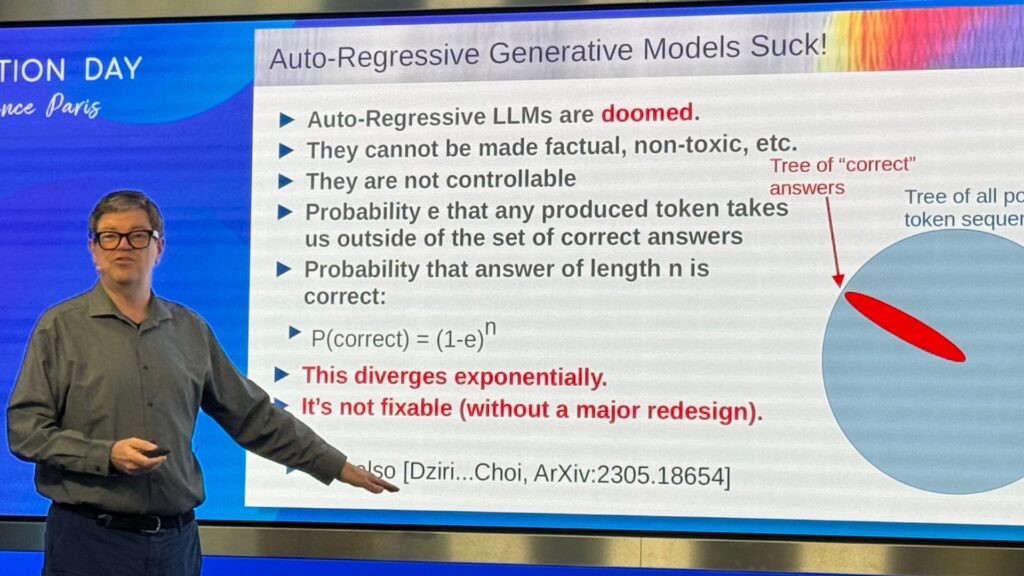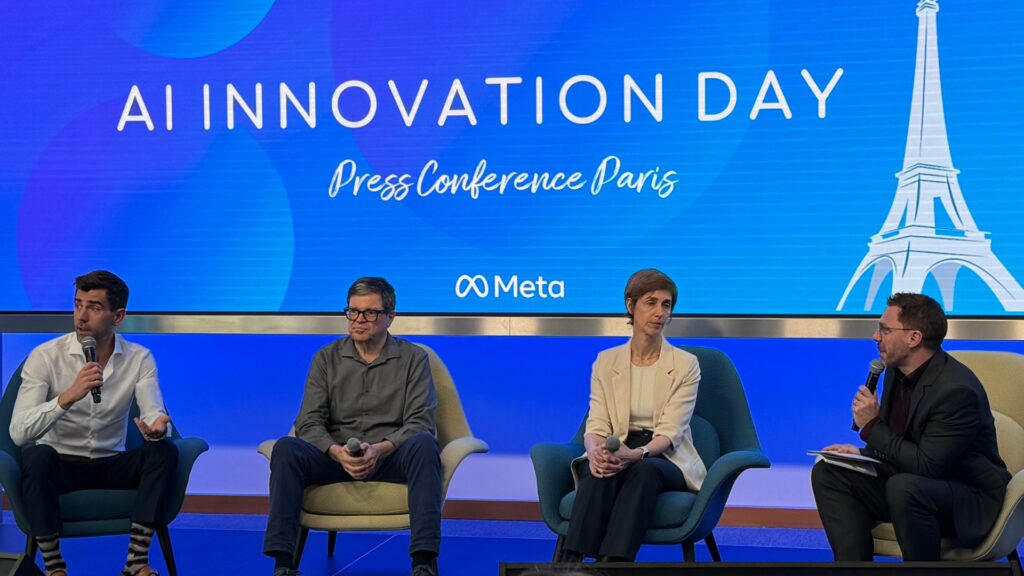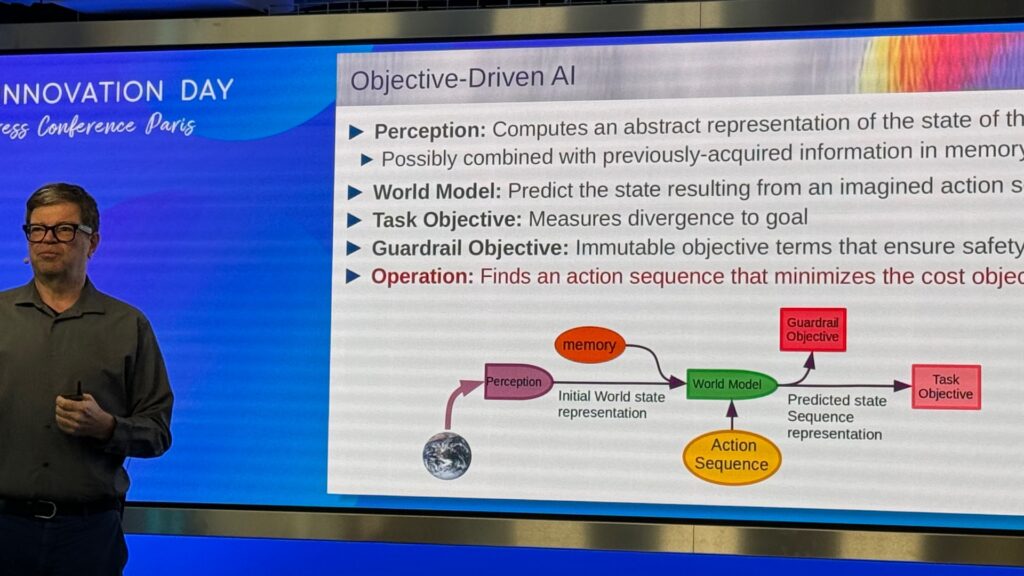Is ChatGPT destined to surpass human intelligence? According to Yann Le Cun, the most famous French AI researcher, the answer is no. Visiting Paris, the Chief AI Scientist de Meta denounces an enthusiasm that he considers disproportionate, while current generative AI “can neither reason nor plan”.
Yann Le Cun has a recommendation for the scientific community: “ we have to stop with generative AI. »
The French researcher, who has now become a pillar of the Meta group in the field of artificial intelligence, has distinguished himself for several months by his appeals to reason, which advocate calm in an environment where everything moves quickly. “ Machine learning sucks compared to humans and animals », he argues.
Visiting Paris on the occasion of the Meta AI Innovation Day (with Joëlle Pineau, vice-president of artificial intelligence research at Meta), Yann Le Cun presented his vision of a future that he considers possible, but still very unpredictable. Numerama went to meet him.
Artificial intelligences are stupid
In Silicon Valley, generative artificial intelligence is on everyone’s lips. Everyone presents it as a societal revolution… except one person. Since the advent of ChatGPT at the end of 2022, Yann Le Cun has regularly been talked about for his counter-current interventions. The French scientist multiplies tweets that go against the most popular thoughts, does not hesitate to publicly correct Elon Musk and helps the general public understand the challenges of AI.
One of Yann Le Cun’s main positions is that artificial general intelligence (AGI), which is described as as gifted as the human brain, is impossible. He prefers to talk about AMI (Advanced Machine Intelligence), while indicating that current technology is far from intelligent. The proof : ” they cannot think. »

To prove it, Yann Le Cun looked at the process of creating a generative AI, in the current model of the autoregressive process (autoregressive suggestion).
To put it simply, scientists give a computer “corrupted” text, from which they remove words. The AI must recompose it, based on the billions of documents that it was able to consult beforehand. “ It’s not logic », Notes Yann Le Cun, since a language model has no understanding of the world around it. It just generates the next word, term by term. These models also ignore how to use tools, making any complex mathematical task impossible. The operation is the same for a video generator, with missing sequences to be recomposed.
Another example from Yann Le Cun: at 10 years old, a child becomes able to set a table by imitating his parents. A robot will never be capable of doing this on its own. “ They’re not that smart », continues Yann Le Cun, who really sees the inability for an AI to understand essential things, such as gravity or distances, as a fundamental weakness.


During his presentation, Yann Le Cun also made a funny comparison between a child’s brain and a standard-sized language model.
According to him, it would take 170,000 years for a human to learn all the large language model (LLM) tokens. However, with two million optical nerve fibers that transfer the equivalent of 10 bytes per second, a human brain records 50 times more data than an LLM in 4 years. His conclusion? “ Generative AI is 50 times less intelligent than a 4-year-old », since she does not reason.
The emergence of a new type of artificial intelligence
Are we wrong to be impressed by ChatGPT? Not necessarily, since these tools can be very good at what they do, to take care of low-level tasks, but painful or time-consuming, or not very cerebral (like ordering a list containing many items). What Yann Le Cun says is that ” the fear “ to see them surpassing human beings is wrong, at least in 2024, and for the near future.
For the Frenchman, the future of AI is“Objective-Driven AI Architecture” (goal-driven AI architecture). It would no longer be a regressive model, with one word predicted at a time, but a planning model, which can anticipate things. He had already mentioned this idea several months ago, during rumors about Q Star, the secret OpenAI model that some imagined would rival the brain.
With a planner model, artificial intelligence would enter a new era. She could understand the world, have a persistent memory, plan actions in advance before generating content, ask herself questions (am I doing it right? Is it dangerous?) and think about the consequences of her actions . The problem is, currently, “ we have no idea how to do it », admits Yann Le Cun.


According to some researchers, planning AI could arrive in a few months or years. Yann Le Cun is less optimistic. “ It’s a small community. Everyone is working on the same thing », he tells Numerama.
In other words, if someone had solved the mystery, the information would have leaked. He possibly imagines a breakthrough within 10 years, but without certainty that it will be possible. “ The hottest thing right now is generative AI, but I’m telling you the world should move on “, he quips.


And the famous Q Star, which OpenAI has still not revealed? Yann Le Cun regrets that“OpenAI has closed like oysters since the partnership with Microsoft”. He indicates that he is certain that Sam Altman’s company or DeepMind (a division of Google specializing in AI, like Brain) are working on the subject, but does not know where they are: “ Q Star, we don’t know what it is, but they’re working on some planning. »
Will Meta, whose influence in AI is relatively unknown to the general public, be able to succeed in bringing artificial intelligence to billions of people? Perhaps, but that is not the role of Yann Le Cun, who has no leadership role today. “ I’m just giving people ideas » he laughs.
Do you want to know everything about the mobility of tomorrow, from electric cars to e-bikes? Subscribe now to our Watt Else newsletter!
